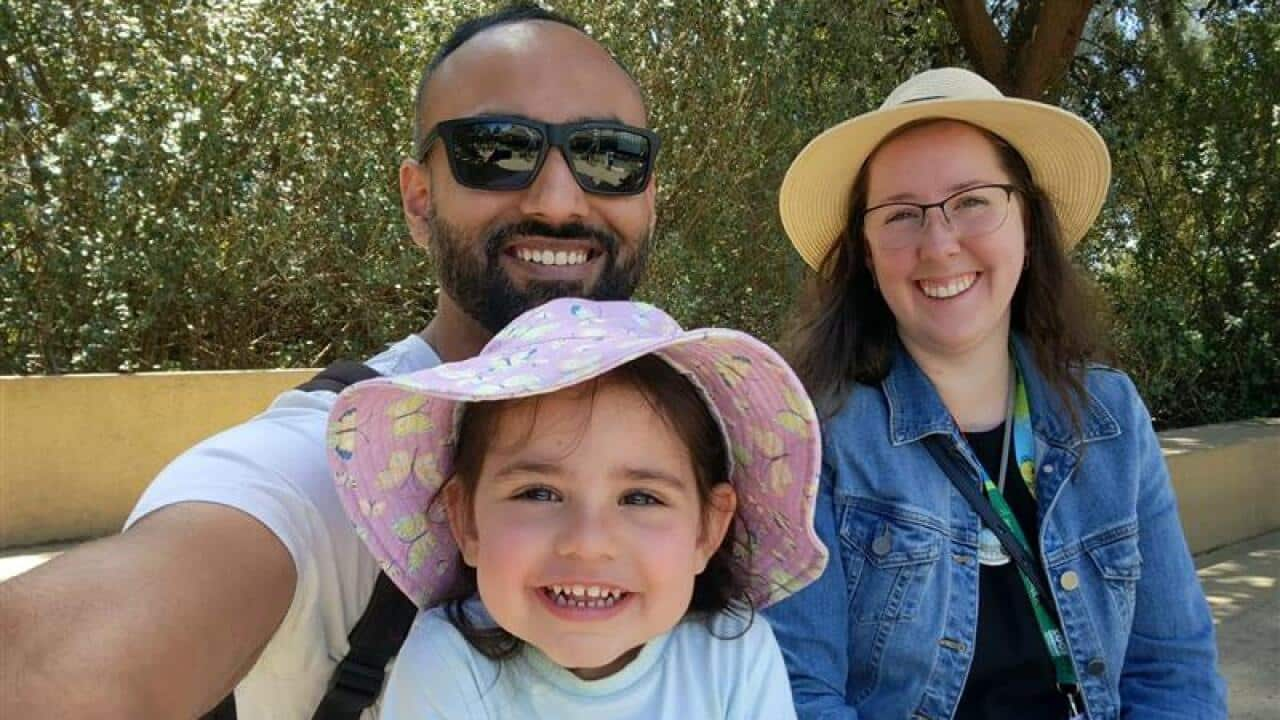Many Australian children grow up reading in English, but three-year-old Anaiya Bains can do so much more.
And it's all thanks to her father Gagandeep Bains. He is teaching Anaiya his native Punjabi, after migrating to Australia from the Punjab region of India in 2009.
"From the time she was born, we wanted to teach her Punjabi as well as English, but the picture books we had were either only in Punjabi or in English," he said.
The family lives in a suburb north of Melbourne and self-publishes bilingual books at home. Bains said his initial motivation was a struggle to find bilingual story books that were also age-appropriate.
Working with his Australian-born wife Bethany, Bains decided to write stories based around family life, and in 2023 they co-founded Tiddu Books.
"For example, one storybook is about a relationship between a father and the child," he said.
"Our books are transliterate, so any English-speaking person can say the words in Punjabi. It is an easier way for the kids to learn Punjabi," he said.
Bethany Bains is a working high school English teacher and has donated some of their bilingual picture and colouring books to Anaiya's daycare.
"The feedback has been really positive," she said. "A lot of people in this community are either of Punjabi background or have some kind of other language that they speak at home."
The benefits of bilingualism
As a keen book lover, Bethany started reading to Anaiya soon after her birth.
"Studies show how important it is to read to your kids and get them interested," she said. "So, I started reading to Anaiya from around one week old.
"Just looking at books and being around words helps children later on in life. So, we made that part of our routine every day."

Bethany Bains started reading to daughter Anaiya when she was one week old. Source: SBS / SBS Punjabi
As professor Rauno Parrila from the Australian Centre for the Advancement of Literacy explained, these benefits last a lifetime.
"The latest data we have is that about three-quarters of parents of zero to two-year-old children read regularly to their children. And that's really good news," he said.
"Reading regularly, even five to 10 minutes a day will help a child's language development.
"We also know that from a young age there are cognitive benefits in learning a second language, too."
Parrila also said adults who speak multiple languages seem to experience a slower cognitive decline as they age.

Rauno Parrila is the head of the Australian Centre for the Advancement of Literacy, which trains teachers and runs a language clinic. Source: SBS / Cameron Carr
"So, in my case, the non-dominant language in the family was Finnish and it was very, very important that I kept on reading [Finnish] with my daughter," he said.
He recommends parents start teaching a second language from a young age.
"My advice to parents is to read regularly, and make sure that you read in both languages in those families where there are two or more languages spoken," he said.
More than just education
Gagandeep Bains said reading to Anaiya in Punjabi was not just about learning the language, but connecting with culture as well.
"I think it's really important that we teach our children about our country, and where we came from," he said.

The Bains speaking Punjabi to relatives in Canada. Source: SBS
"And when we do a video call, she tells them the things that she learned in Punjabi, and she can easily communicate with them."
In fact, as Anaiya improves her Punjabi, Bethany Bains says the whole family benefits.
"I understand a lot more than I can speak, but it's great now that Anaiya corrects me and tells me what the words are. So, I have two teachers, which is really, really nice," she said.
Although the family bookshelves are full, she is always acquiring more.
"I get told off of buying new books for Anaiya," she said. "But sharing language, sharing stories, it's the way we express ourselves and have done since the start of time."

The Tiddu story book called My Amazing Father. Source: SBS
"So far we've done picture books, colouring books and there is also a storybook," Gagandeep said.
"However, we do plan to release more books about family, about culture.
"That's our intention for the future," he said.
This story was produced in collaboration with SBS Punjabi.














